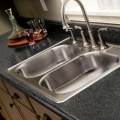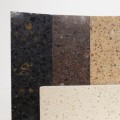When designing or renovating a kitchen, choosing the right countertop is one of the most important decisions you'll make. The countertop is not just a functional work surface; it's also a significant design element that can define the overall aesthetic of your kitchen. Durability is a key factor to consider, especially in a space that sees heavy use. Whether you’re slicing vegetables, rolling out dough, or placing hot pots directly on the surface, your countertop needs to withstand daily wear and tear while maintaining its appearance over time. With numerous materials available, it's essential to know which type offers the best combination of durability, style, and maintenance needs. This guide will explore the most durable kitchen countertop options, helping you make an informed decision for your home.
Granite: The Classic Choice for Durability
Granite has long been a popular choice for kitchen countertops, and for good reason. This natural stone is renowned for its durability and resistance to scratches, heat, and stains. Granite countertops are formed from molten rock that has cooled and solidified over millions of years, resulting in a dense and hard surface that can handle just about anything you throw at it. Whether you're placing a hot pan directly on the countertop or using it as a cutting board (although not recommended), granite can withstand the rigors of a busy kitchen.
In addition to its durability, granite offers a timeless beauty with a wide range of colors and patterns, making it easy to find a style that complements your kitchen design. However, it’s important to note that granite requires regular sealing to maintain its stain resistance. With proper care, a granite countertop can last a lifetime, making it a solid investment for your home.
Quartz: Engineered for Strength
Quartz countertops, made from engineered stone, are another top contender in the durability category. Unlike natural stone, quartz is manufactured using a combination of crushed quartz crystals, resins, and pigments, creating a non-porous surface that is exceptionally resistant to stains, scratches, and impact. One of the main advantages of quartz is that it doesn’t require sealing, making it a low-maintenance option for homeowners who want durability without the upkeep.
Quartz is also highly versatile in terms of design, offering a wide array of colors and patterns, including options that mimic the look of natural stone. Its uniform appearance and ability to be customized make quartz a popular choice for both modern and traditional kitchens. Additionally, because quartz is an engineered product, it is more environmentally friendly than some other materials, as it can be made from recycled content and its manufacturing process is more controlled.
Concrete: Industrial Strength Meets Custom Design
Concrete countertops are gaining popularity for their industrial-chic aesthetic and exceptional durability. When properly sealed, concrete countertops are resistant to scratches, heat, and stains, making them a great choice for those who want a custom look that can withstand the demands of a busy kitchen. Concrete can be poured into any shape or size, allowing for complete customization in terms of thickness, texture, and color. This flexibility makes concrete a favorite among homeowners who want a unique and personalized kitchen design.
However, it’s important to understand that concrete requires more maintenance than some other materials. It needs to be sealed regularly to protect against staining and water damage. Additionally, concrete can develop hairline cracks over time, which adds to its rustic charm but may not be desirable for everyone. With the right care, though, concrete countertops can be a long-lasting and visually striking choice.
Stainless Steel: The Professional’s Choice
Stainless steel countertops, commonly found in professional kitchens, are prized for their industrial strength and modern aesthetic. This material is virtually indestructible, resistant to heat, stains, and water damage, and easy to clean, making it ideal for a high-traffic kitchen. Stainless steel is also naturally antibacterial, which is a significant advantage in a food preparation area. The sleek, reflective surface of stainless steel can complement a wide range of kitchen designs, particularly those with a contemporary or industrial vibe.
One downside to stainless steel is that it can scratch easily, and fingerprints and smudges are more visible compared to other materials. However, these surface imperfections often blend into the overall look of the countertop, adding character rather than detracting from it. For those who prioritize durability and hygiene, stainless steel is an excellent choice.
Conclusion: Choosing the Most Durable Countertop
When it comes to durability, granite, quartz, concrete, and stainless steel each offer unique advantages, making them some of the best choices for kitchen countertops. Your decision should be guided by how you use your kitchen, your design preferences, and the level of maintenance you’re willing to undertake. For a classic and virtually indestructible surface, granite is a tried-and-true option. Quartz offers a balance of strength and low maintenance, while concrete provides customizability with industrial toughness. Stainless steel, on the other hand, is the go-to for those who value durability and a sleek, professional look.
Incorporating durable materials like these into your kitchen ensures that it will not only stand up to daily use but also maintain its beauty over time. Just as Landscape Lighting Boca Raton enhances the longevity and aesthetic of outdoor spaces, choosing the right countertop material can elevate the durability and design of your kitchen, making it a space you’ll enjoy for years to come.






